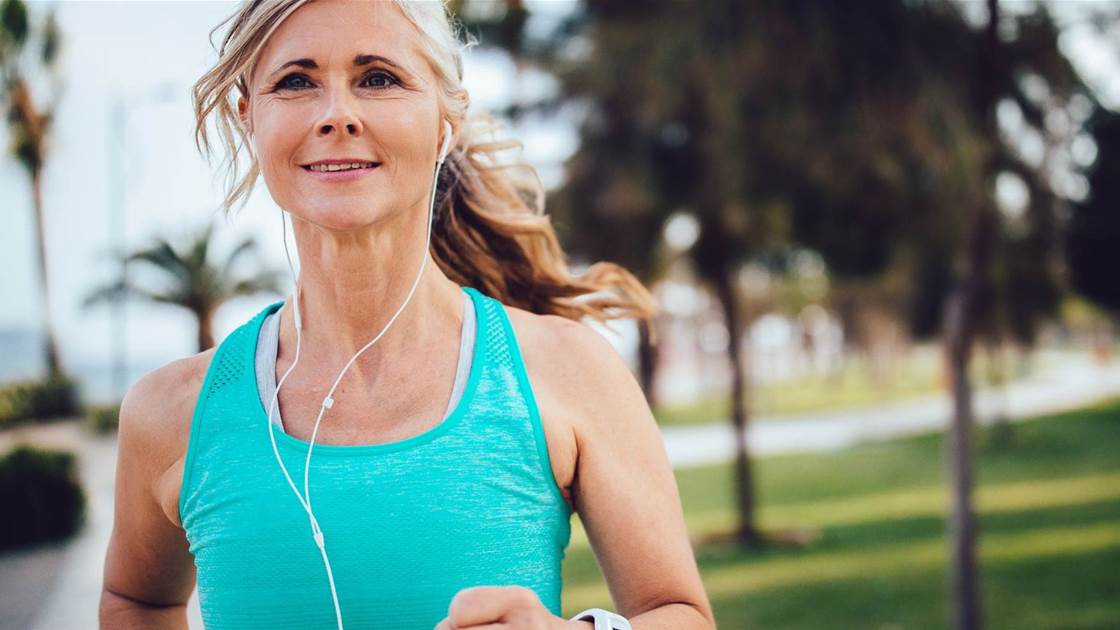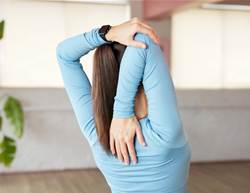As you get older, there's no denying that it becomes increasingly harder to lose weight. That's because we lose muscle mass at an average rate of three to five percent for every 10 years after age 35. This can impact the way your body burns fat.
“Your body goes into its aging stage as it leaves the growing one,” says Dr Luiza Petre, weight loss and cardiology expert. “When this happens, your body doesn’t need as much energy as it used to,” Dr. Petre explains.
Why it's so hard to lose weight after 50
What's more, those years of playing sports, sitting, walking up and down stairs, and moving, in general, take their toll on joints and muscles. You may notice that your joints are a little stiffer and sorer than they were a few decades ago. Then, there's the issue of your ever-slowing metabolism.
"There are a number of roadblocks people in their 50s will face when trying to lose weight," says Brian Durbin, a strength and conditioning specialist and personal trainer. "But once you know what they are—and how to work around them—it's easy to be successful at dropping pounds."
While it’s not impossible to lose weight after 50, the methods you used in your 30s or 40s are not going to work the same way. Follow these tips to help you drop the pounds—and keep them off for good—courtesy of some of the world’s best weight-loss experts, dietitians, and personal trainers
1. Talk to your doctor about a weight-loss plan
It’s never a good idea to create a weight-loss plan for yourself without speaking to your physician first—especially if you have any preexisting health conditions. "Before you get started, it helps to fully understand your current state of health before beginning any diet or exercise plan," advises Dr. Petre.
Be clear with your doctor what you hope to achieve, and ask for suggestions regarding diet and exercise. Your doc may even be able to recommend a physical therapist or personal trainer for you.
2. Get your hormones checked
As we age, progesterone, testosterone, and other hormones decline, which sets the body up for storing fat instead of losing weight, says Jennifer Burns naturopathic physician. "Simply getting your thyroid, adrenal glands, and other hormone levels checked—and then taking the appropriate steps to bring them back into balance—can go a long way toward helping people in their 50s lose weight," says Burns.
Author of The Hormone Secret: Discover Effortless Weight Loss and Renewed Energy in Just 30 Days Dr Tami Meraglia agrees, adding that she believes the hormone to focus on is testosterone—especially for women over 50 who are trying to get fit. "There is ample discussion in the medical community about the effects of oestrogen loss, but few people are aware of the importance of sufficient testosterone levels, which can help a woman slim down," says Dr. Meraglia. In fact, research shows that balanced testosterone levels reduce blood glucose levels, which may help promote weight loss and shrink stubborn belly fat.
3. Set realistic goals
Declaring that you’re going to lose 10 kilograms in one month is unrealistic, not to mention unhealthy. “Be honest with yourself. How do you feel? How healthy are you? Making life changes takes courage and mental fortitude,” says Dr. Petre. Be realistic—and break up big goals into smaller, more achievable ones. Focusing on how you're feeling and the positive changes you're making to your lifestyle, instead of the number on the scale, will help you stay motivated to reach your goals. “Triumphs make your courage grow,” she adds. “Small achievements amount to large goals achieved.”
4. Hire a dietitian
If you're not sure which diet works best for your lifestyle, talking to a dietitian can help you identify the right eating plan for you. Whether you're considering the flexitarian diet, intermittent fasting or even keto, a dietitian can break down the pros and cons of each plan and help you choose one that fits your nutritional needs and goals. Consulting with a dietitian will also give you ideas on how to resolve road blocks that may get in the way of your weight-loss goals, like emotional eating, food sensitivities, nutritional deficiencies, meal boredom, etc.
5. Follow a structured plan
If you want to succeed in losing weight, following a structured plan can help, says Dr. Petre. “Instead of trying and failing at yet another yo-yo diet get serious about your health by following a trusted program,” she suggests. She explains that medically supervised programs have a success rate for weight loss of more than 75 percent. “It has been proven that individual support programs can encourage a significant change in behaviour and reinforce long-term success,” she adds. Diet programs that include weekly visits can also provide accountability and continued support to keep the momentum going.
The best diets for weight loss 2019 include the Mediterranean Diet, the DASH Diet and the MIND diet. These diets have been proven to support weight loss, while also improving your health and reducing risk for heart disease, diabetes and Alzheimer's, among other health conditions.
6. Embrace strength training
If you find it tough to make it to the gym at all, let alone brave a weight room filled with buff 20-somethings, here's a little motivation: Once you hit 50, you've got about 20 percent less muscle mass than you did when you were 20. And because muscle is metabolically active, muscle loss equals a slower metabolism. That makes you much more likely to put on (and hold on to) extra pounds, says Durbin. "The good news is you can turn all of this around with a well-structured weight-training routine," he says. "That can increase your muscle mass and help you regain the ability to lose weight like you were able to 20 years ago," he says. Aim to lift weights at least twice a week, whether you use free weights, machines or do bodyweight exercises. It doesn't hurt to lift every day—just make sure to work different muscle groups or train differently each day.
7. Choose activities that are easy on the joints
Janna Lowell, personal trainer, says she gets the best results among her 50-somethings when she has them do cross training in the pool. Tired joints can keep this population from getting a great workout, she says, and aches and pains can turn some people off exercise completely. "Water exercise is easy on the joints and can boost range of motion as well," says Lowell. "Even better, caloric expenditure is about 30 percent greater in the water than on land due to the resistance water creates." No pool? No problem. Walking is another great, low-impact cardiovascular exercise, as are cycling, kayaking, yoga, and dancing.
8. Make the most out of every workout
Just because your joints are a little achier than they used to be doesn't give you an excuse to phone in your workouts. Alex Allred, personal trainer, says this is one of her biggest pet peeves among 50-year-olds. "Far too many people think that just because they showed up, they're working out," says Allred. "But you need to be focused on what you're doing and pushing yourself hard enough to break a sweat or at least complete the full range of motion of a certain exercise." Not sure if you're doing a move properly? Ask! "I wish more people would flag down a trainer and ask, 'Am I doing this correctly?' " says Allred. It can make the difference between making the most of your exercise time to lose weight and wasting your time and injuring yourself.
9. See a physical therapist
The advice to consult your doctor before starting any new exercise regimen is great, but Samira Shuruk, personal trainer, suggests taking this advice a step further: Make an appointment with a physical therapist—particularly if an aching back, knee, or other body part has kept you from working out on a regular basis. "After 50, many people have sustained injuries and don't know what their activity options are," says Shuruk. "This makes it tough to exercise in ways we used to, and getting advice from a professional can truly help." Physical therapy can also help you rehabilitate an old injury or ease joint and muscle pain, setting you up for pain-free workouts.
10. Overhaul your diet
Remember that metabolic slow-down? It can mean that you're burning about 250 fewer calories each day. If you continue to eat like you're in your 30s—and don't increase your exercise—you'll gain weight, plain and simple, says Katie Ferraro, dietitian. "To lose weight when you get older, you have to eat fewer calories," says Ferraro. Eliminating the junk food in your diet and replacing them with loads of fruits, vegetables, whole grains, and lean proteins can make cutting calories painless.
11. Change how and when you eat
It’s not just what you eat, but how you eat that matters in your 50s, claims dietitian Anthony Dissen. He suggests focusing on fullness, not portion control, when planning your meals. “If our stomachs aren’t full, we don’t feel full, and we’ll stay hungry,” he points out. “When it comes to healthy weight loss and management, we want to strike that important balance between eating until we feel full and satisfied while still decreasing our overall calorie intake.”
Also, stay away from fad diets. “No crazy fasts, cleanses, cutting out fats, or complex carbohydrates or proteins,” adds Jillian Michaels, personal trainer and wellness expert.
12. Get your stress in check
This decade can be prime time for stress, says Durbin. "The average 50-year-old has many more responsibilities than their younger peers. They're often in their prime income-generating years, which means extra responsibilities at work. They may also have kids who are going to college—a financial burden—or have ageing parents who they're helping to care for." The result? Emotional eating and a schedule that seems too jam-packed for regular exercise sessions. The solution: Schedule your workouts like they are doctor's appointments, says Durbin. Sticking to a consistent routine can not only help ease stress, but also help people stay on track with their diets. After all, who wants to ruin the benefits of a tough sweat session by eating a donut?
13. Get your sleep
Getting seven to eight hours of sleep every night is key, maintains Michaels. In addition to leaving you feeling rested, Dr. Petre adds that the two hormones that regulate appetite—leptin and ghrelin—go into overdrive without it. “This can trigger excessive hunger and lead to poor food choices and weight gain at any age,” she says.
14. Be mindful… and meditate
It’s important to practice mindfulness, especially when you’re eating. Dr. Dissen explains that most people have more control over their time and schedules during their 50s than ever before, due to decreased responsibilities with work and family, and they should take advantage of it. “The more we try to multi-task while we eat, the more likely we are to overeat and not feel as satisfied by the meal or snack we’ve just eaten,” he explains. “By simply taking a breath and treating our mealtime as special, it allows us to really taste our food and notice its flavours, textures and tastes.”
Mindfulness can aid in stress relief, which is important because many people eat or put off exercise when they are anxious. Michaels suggests practicing five to 10 minutes of meditation daily to maintain your brain’s neuroplasticity and stress management.
15. Practice self-care
Practicing self-care, whether it's treating yourself to manicure or taking a mental health day from work, shouldn't be looked at as a luxury. The smallest gestures can make a big difference in reducing overall stress, which can make a big impact on your weight loss. When you show yourself a little more love, you can turn your energy into doing things that support your goals, like eating healthy, exercising, and meditating. Not sure how to start a self-care routine? First ask yourself why you need more time to take care of yourself. Are you working too many late hours at the office? Do you feel burned out and wish you could be calmer? Once you figure out why you need to make some more time for yourself, it can help you decide what will be a good activity or routine for you.
Like what you just read? You’ll love our magazine! Go here to subscribe.









